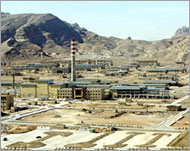UN agency: Iran restarts nuclear work
The UN nuclear watchdog, the International Atomic Energy Agency, has confirmed that Iran has restarted nuclear activities that had been mothballed under a deal with the European Union’s three biggest powers.

“IAEA Director General Mohamed ElBaradei informed members of the (IAEA) board of governors that Iran today started to feed uranium ore concentrate into the first part of the process line at the uranium conversion facility,” it said in a statement.
“It should be noted that the sealed parts of the process line remain intact.”
Emergency meeting
The IAEA board will hold an emergency meeting on Tuesday to discuss the escalating standoff over Iran’s nuclear ambitions.
Iran suspended all parts of its nuclear programme that could be used to produce enriched-uranium fuel for nuclear power plants or weapons under a deal it reached with France, Britain and Germany in Paris in November.
 |
|
The IAEA seals in the facility |
The EU trio, sharing Washington’s suspicions that Tehran’s nuclear programme is aimed at developing atomic weapons, has asked Tehran to give up all sensitive nuclear activities in exchange for economic and political incentives.
Iran has refused, insisting its programme is aimed solely at the peaceful generation of electricity.
Seals
To monitor Tehran’s compliance with the Paris agreement, the IAEA had sealed sensitive equipment at Iran’s uranium conversion facility at Isfahan and its uranium enrichment plant at Natanz.
Diplomats from the EU trio said the question of whether or not Iran had broken IAEA seals was a crucial one, as it would determine the severity of any violations of the Paris agreement.
The Vienna-based IAEA said it has installed cameras at Isfahan to monitor Iran’s renewed activities at the plant.
“This activity was commenced following the installation today by the IAEA of cameras … but regrettably prior to completion of the in situ testing of the cameras, which normally takes 24 hours following installation,” the IAEA said.